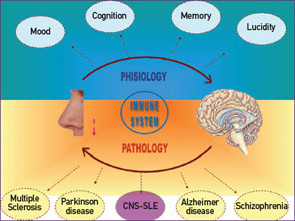The patients with SLE that we examined using the smell test fared significantly worse than age- and sex-adjusted controls. The impaired smelling capacity correlated with the SLEDAI activity index and was more prominent among patients with CNS involvement.14 These results are in accord with recent anatomical observations, including MRI scans, showing that patients with SLE have a reduction in the size of their amygdala that correlates with the duration and activity of the disease.15,16
Being a clinician and a basic immunologist, I was very excited by each discovery. Yet, being skeptical, I was always surprised to see how much is known and already published in the literature, but ignored by the conservative physician world. I shared my findings with my neighbor (a “natural” healer). She smiled at me saying, “We’ve know this for years! And we’ve used it for years!”
I will note that aromatherapy was far from my interest but, considering our results, I started to dwell into this field of complementary and alternative medicine. Like all other fields of alternative medicine, aromatherapy lacks many well-controlled, double-blind studies, although a few such studies exist (cited herein) and, in my research, we are dealing with chemicals (fragrance) and neuronal receptors. However, it seems that a more intensive research of the effects of lupus on olfaction may lead to the better understanding of neural disturbance in this disease and the development of new series of therapies that may involve using aromatherapy to improve mood.

Defects in smelling capabilities have already been reported in other autoimmune diseases such as multiple sclerosis and in other neurological diseases conditions including Parkinson’s and Alzheimer’s diseases.17-19 (See Figure 3, above.) The dampened smelling capability appears at the early stages of these diseases and may have a predictive value for ultimate outcome. Aberrant smell function also characterizes depressive women and can be ameliorated by exposing the patients to orange or lavender fragrances (i.e., aromatherapy).
The 2004 Nobel Prize in Medicine was granted to Linda Buck and Richard Axel for research on odorant receptors and olfactory system organization, and for deciphering the 1,000 genes for odor (in humans, only 350 genes still function). This seminal research emphasized the diversity of smell options (especially if combined with memory and emotions) in comparison to other senses, such as taste or vision, which only have a few associated genes.